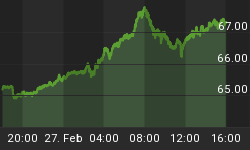HIGHLIGHTS in "Gold Forecaster - Global Watch"
Silver - COT, Gold : Silver Ratio EDR.to, SSRI, PAAS, SIL, SLW / Platinum.
SHARES: HUI, NEM, FCX, NG, VGZ, GSS, GOLD, GFI, DROOY, Portfolio
Index:
1-2. Market Forecasts / Short-term forecasts across the Board!
2-3. Comex Update
3-14. Central Bank gold Sales in 2006 / Krugerrand demand / Shares not performing yet, but gold has and is / The U.S.$ and its prospects / Exchange Stabilization Fund / Capital Controls in the U.S. / Indian Demand/ The Oil crisis / Gold: Oil Ratio / Dow Jones / Technical Analysis of the Gold Price: Long / Gold price drivers 2006 / Short term in the U.S. $ / Treasury Notes / CRB Index
13 - 29. International Gold Markets / Silver / Gold vs. Silver / Gold:Silver Ratio / Platinum / Silver & Gold Shares br> Shares
Trial Sub. 3 months for $99 - go to www.goldforecaster.com.
Do you want to receive your own copy of Excerpts from "Gold Forecaster - Global Watch"?
- Send your e-mail address to: gold-authenticmoney@iafrica.com.
 Capital Exchange Controls for the U.S?
Capital Exchange Controls for the U.S?
We described how if the U.S.$ declined substantially, it could lead to Capital Controls to protect against foreign governments' withdrawal of their investments in the U.S.A. Of course this would be in a global climate of severe trade disruption with many nations instituting trade protection measures as well as being prepared for Capital Controls to protect their nation's capital base. The U.S. would be particularly likely to impose Capital Controls because of the huge volumes of externally owned U.S. currency.
How would such controls be imposed? The first point of protection and control would be the U.S. Treasury market, where discouragement from selling would be heavy. Thereafter history guides us to the most pertinent example was the decline of the previous global reserve currency, the Pound Sterling.
This reached crisis stage as both the $ and the Pound were 'floated' in 1971. With the U.K. no longer the prime economy on this earth, a mantle it had passed to the U.S. $, it had to protect itself against the outflow of foreign capital from its shores.
The way it chose was to leave international trade alone, permitting all trade transactions to flow through the foreign exchange rate against the $ as quoted on foreign exchanges prior to the imposition of Capital Controls. For want of a better title we shall call this the "Commercial Pound".
However, the Bank of England separated all Capital transactions from the Trade transactions and required all incoming and outgoing transactions to go through authorized dealers [Banks, Stockbrokers primarily]. They had to go through the "Dollar Premium" a title aimed at all who wished to bring capital into the country.
All who wished to take capital out had to pay that "premium" [a discount to the $ exchange rate varying from 10% to 30 %]. Of course anyone who had foreign investment to bring into Britain had to do so through the Dollar Premium and gained the benefit of the Premium as it added that to the capital imported. Thus new investors to Britain gained up to a 30% "premium" with which to invest in Britain.
As gold was rising, gold shares then quoted on the London Stock Exchange as well as in Johannesburg, were extremely popular. The transactions could prove complex. For instance, if a Swiss banker wished to buy South African gold shares, he bought in London.
To do this he had to convert his Swiss Francs into U.S. $s send them through the "Dollar Premium" where they were changed into Sterling and the South African shares bought on the London Stock Exchange for Pounds.
However, the loss achieved on the export of funds from the U.K did discourage the capricious dis-investors. The desire to export the foreign owned [or locally owned funds seeking an exit] funds was measured by the rate the Premium rose to, which peaked at +30%. After a few years the rate diminished back to 10% before it was abolished. It acted simply as an escape valve, taking away excessive pressure, but keeping the bulk under pressure and contained.
There have been far worse systems of Exchange Controls in different countries.
- In South Africa, Exchange Controls have been a fact of life since the sixties with a small break only and remain to this day.
- In Zimbabwe exchange Controls have been in place since Smith declared Independence and broke away from Britain until now, where the most effective form of exchange control exists, a worthless currency and a destroyed economy undergoing hyperinflation.
Of course, should this happen to the globe's prime economy, the U.S., the ramifications for the rest of the globe could prove horrendous!
In the U.S. were such controls to be imposed we would expect the U.S. liquid assets [Bonds and Bills] to experience controls first, but thereafter the foreign exchange markets would have the controls imposed on them in a similar manner to the U.K. in the early seventies.
In the next part we will look at just how Capital Controls could appear in the U.S. should it need to protect itself from a flight of capital. The effects it will have within the U.S. will also be examined, as will the ripple effects outside the U.S.
To Subscribe to "Gold Forecaster - Global Watch", please go to: www.goldforecaster.com.
![]()















